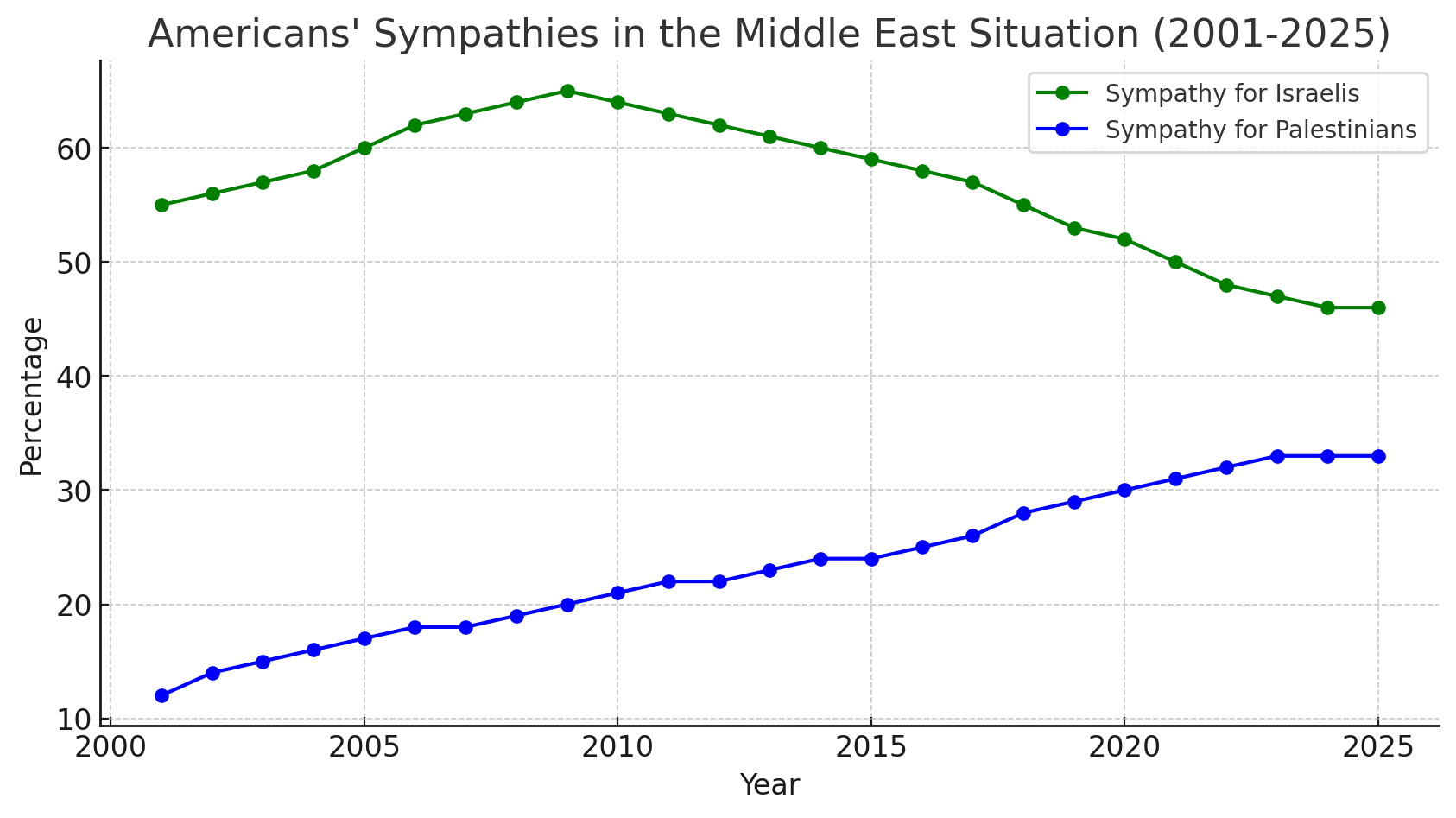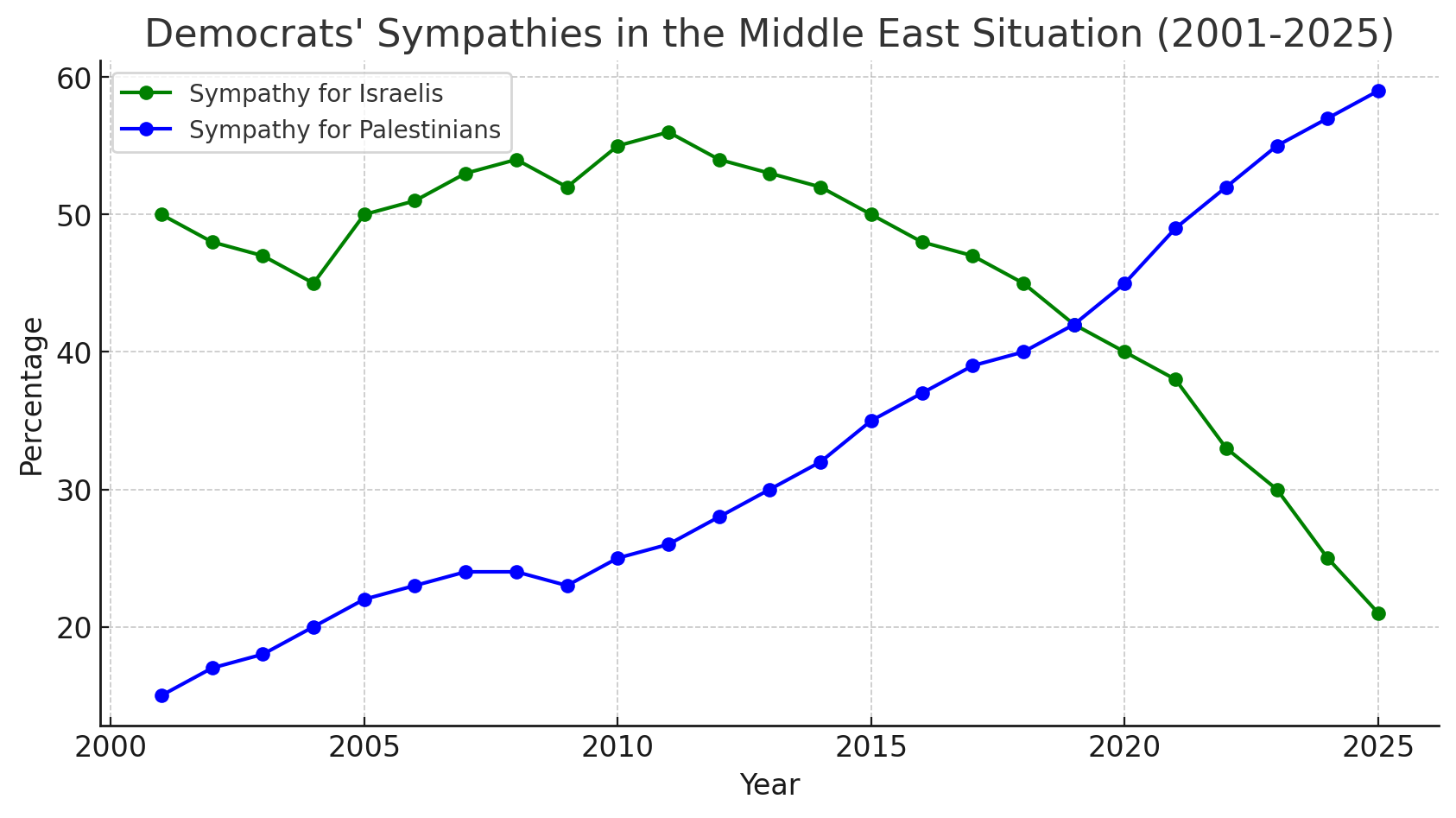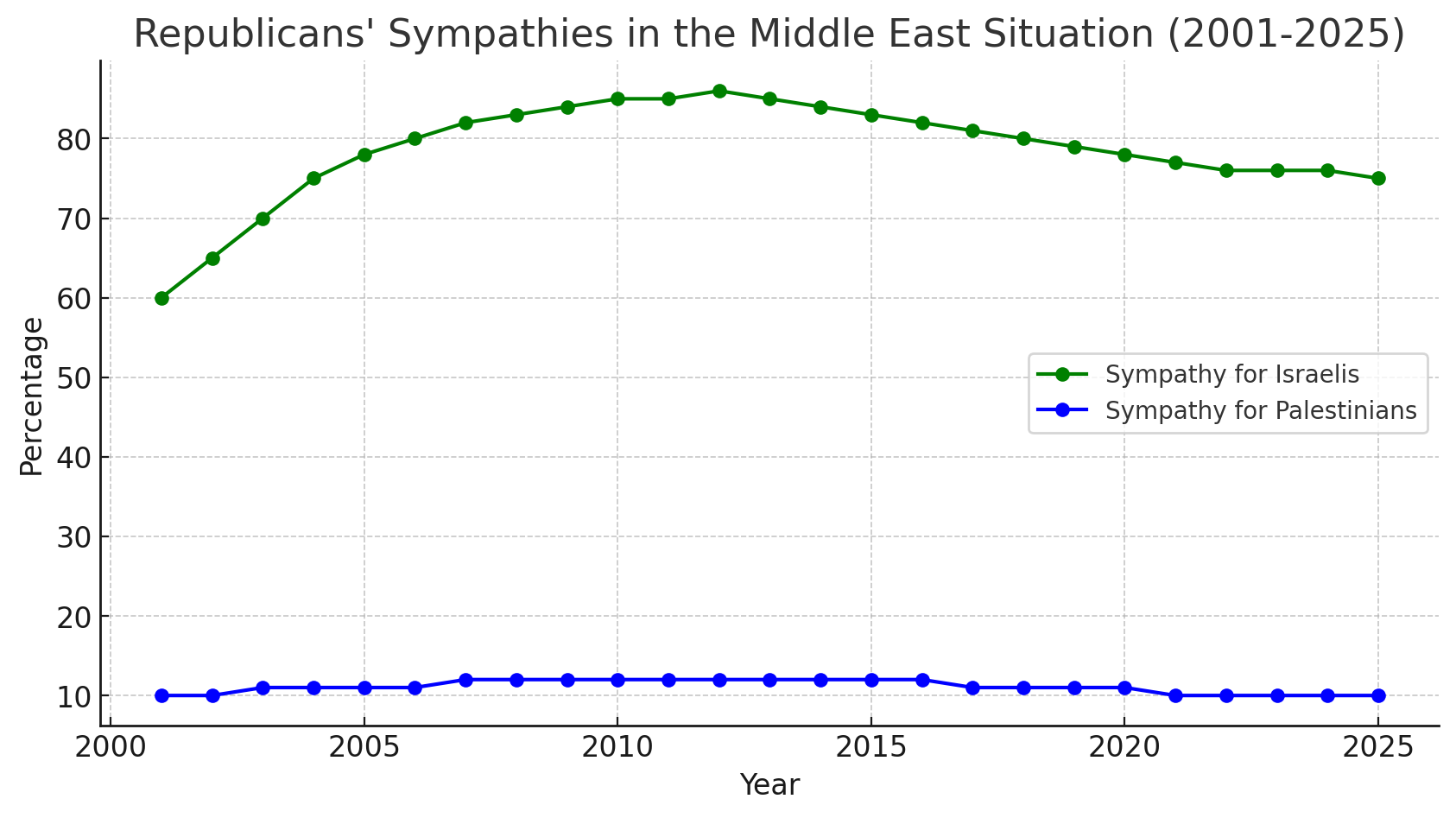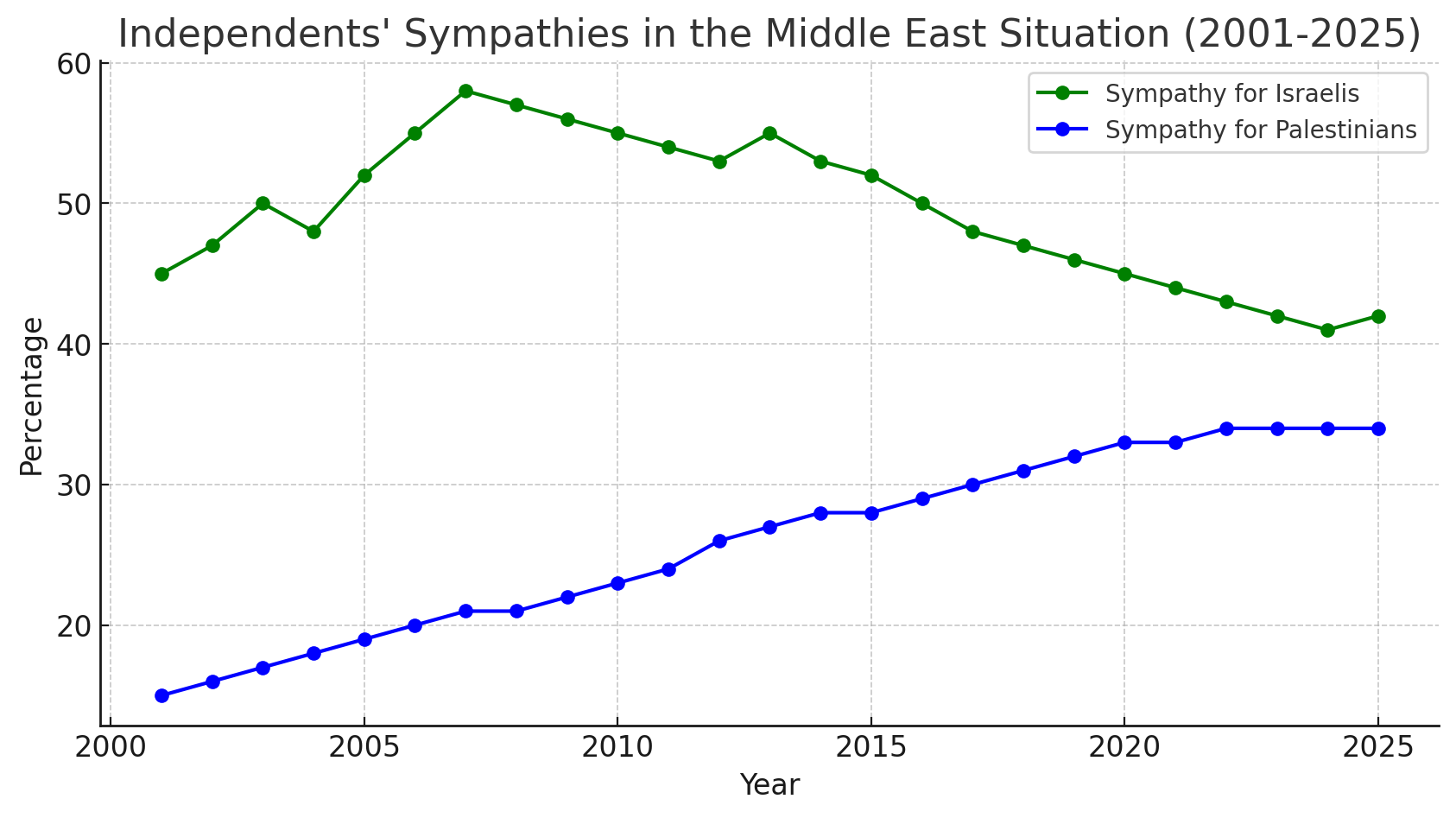For the First Time in History, Israel Loses the Sympathy of the Majority of Americans, According to the Latest Polls
In an unprecedented shift, a Gallup poll has revealed that the percentage of Americans who sympathize with Israel has dropped to 46%, the lowest level in 25 years, while sympathy for Palestinians has risen to 33%, the highest recorded by the institution since the metric was first measured. This transformation reflects fundamental changes in American public opinion, primarily driven by increased awareness of the Palestinian cause and the weakening dominance of the Israeli narrative. This shift has been influenced by changes in media coverage patterns, student activism, and demographic transformations, all of which have played a crucial role in reshaping American perspectives on the Israeli-Palestinian conflict.

Gallup is one of the most reputable research institutions in the world, providing accurate public opinion polls that reflect American societal trends since 1935. Among its most significant annual surveys are those examining American attitudes toward the Israeli-Palestinian conflict. The data suggests that this shift is not merely a fleeting change but a long-term trend that has been forming over the past decade. In 2015, 62% of Americans expressed sympathy for Israel, while only 16% sympathized with Palestinians. Over the years, the gap between the two has significantly narrowed. Events following the October 7, 2023, Hamas attack and the ongoing Israeli military actions in Gaza have played a pivotal role in accelerating this shift. After the attack, Democratic sympathy for Palestinians initially dropped by six points but surged by 16 points within a year, reaching its highest recorded level.

Partisan divisions have always been a major factor influencing public opinion. Republicans remain the strongest supporters of Israel, though their support has declined from 91% in 2020 to 83% in 2025. Meanwhile, Democrats have experienced a dramatic shift, with their support for Israel plummeting from 67% in 2020 to 33% in 2025, while their sympathy for Palestinians has risen to 59%—marking the first time that more Democrats favor Palestinians over Israelis. Independents have followed a similar trend, with their support for Israel declining from 76% in 2020 to 48% in 2025.

When analyzing demographic data, young Americans (ages 18-34) are the most likely to support Palestinians, with 40% expressing sympathy compared to only 29% of those aged 55 and older. On the educational level, college graduates show greater sympathy for Palestinians (39%) compared to those without a degree (27%). Gender also plays a role, as men remain more sympathetic toward Israelis (46%) compared to women (40%), while women express greater sympathy for Palestinians (39% vs. 33%).

Regarding the two-state solution, 55% of Americans continue to support the establishment of an independent Palestinian state, while 31% oppose it, and 14% remain undecided. Support for a two-state solution has seen a slight increase from 52% in 2020 to 55% in 2025, with strong backing among Democrats (76%), compared to 53% of independents and only 41% of Republicans. This trend reflects a sustained shift in American perspectives on the Palestinian cause over the past decade. Before 2015, support for a Palestinian state was below 50%, but it has seen steady growth amid political shifts and growing criticism of Israeli policies.
The Israeli Narrative Loses Its Grip on American Society
This transformation in public opinion reflects increased awareness of the Palestinian reality, largely influenced by the role of social media. Graphic images of suffering, killings, apartheid, and injustices faced by Palestinians have flooded digital platforms, significantly altering how Americans perceive the conflict. Traditional media, which historically dominated the narrative with a pro-Israel bias, has lost part of its grip, allowing the Palestinian perspective to gain more visibility. This change is particularly evident in recent student protests across U.S. universities, where highly educated students have been quick to take a strong pro-Palestinian stance as they have greater access to unfiltered Palestinian voices. Campus movements, such as “Students for Justice in Palestine,” have intensified awareness campaigns and organized demonstrations against Israeli policies, helping shape the political consciousness of younger generations.
Experts predict that these shifts in public opinion will put increasing pressure on Democratic politicians to reassess their stance on the conflict. This could lead to a growing debate within the Democratic Party about reconsidering U.S. military aid to Israel, which has long been a non-negotiable issue in American politics. With a voting base that is increasingly sympathetic toward Palestinians, the prospect of gradual changes in U.S. foreign policy toward the conflict is becoming more likely—even if immediate policy shifts remain unlikely. Additionally, as elite segments of society, such as graduates of top universities, continue to express stronger support for Palestinians, their future roles as policymakers and opinion leaders could have a profound impact on American-Israeli relations in the coming decades.
There is no doubt that these deep shifts in American public opinion will have long-term ramifications for U.S. foreign policy. As this trend continues, a potential reshaping of the U.S.-Israel relationship could occur sooner than previously expected, particularly as a new generation of decision-makers enters the political arena. With increasing public pressure, future U.S. administrations may find themselves compelled to adopt a more balanced approach to the Israeli-Palestinian conflict, potentially reviving diplomatic efforts aimed at reaching a fair and lasting resolution to the Palestinian cause.
But the real question remains: how long can the Israeli narrative withstand these rapid changes? Can Israel maintain its existence if U.S. policy toward it changes? Given that Israel's survival is highly dependent on unwavering American political and military support, could it endure without Washington’s unconditional backing?
